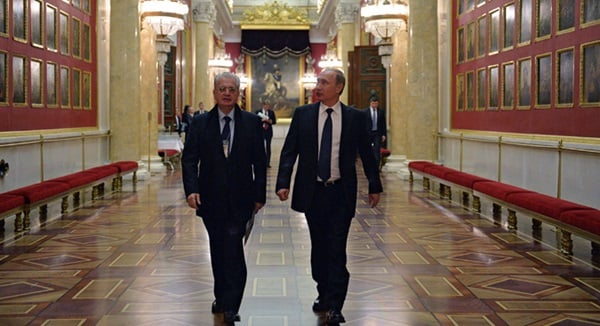
Russian President Vladimir Putin, right, at the State Hermitage Museum with museum director Mikhail Piotrovsky.
Photo: Alexei Druzhinin.
Joy arrived in two forms at the 250th anniversary celebration this past December of the Hermitage State Museum in St. Petersburg: a gift from Russian president Vladimir Putin and an announcement of the launch of several new Hermitage State Museum satellites throughout Russia.
As reported by Russia Beyond the Headlines and elsewhere, Putin gifted to the museum a $16 million Fabergé egg, as well as a clock that jeweler Carl Fabergé created in the late 1800s for the 25th wedding anniversary of Emperor Alexander III and Empress Maria Feodorovna.
Once belonging to the Rothschild family, the Fabergé egg was acquired by Moscow-based billionaire Alexander Ivanov at a 2007 Christie’s auction in London for more than $16 million, then a record price for one of the mechanical jewels. Two years later, Ivanov founded the Fabergé Museum in Baden-Baden, Germany, to house his collection of over 700 Fabergé objects. That institution has recently been the focus of an investigation by British tax agents (see “Tax Agents Raid Fabergé Museum“). Ivanov claims that the British authorities were merely trying to thwart his gift to the Hermitage.
Putin and museum director Mikhail Piotrovsky’s announcement about plans to launch several new Hermitage State Museum satellite museums stated that branches would be established in provincial areas throughout Russia. As reported in Sputnick News and other Russia news outlets, plans are under way for new Hermitage outposts in Omsk, Ekaterinburg, and Vladivostok.
In an interview with Russia’s TASS news agency, Piotrovsky said that exhibitions at the new venues will be “very serious, important, and well thought-out.” He also announced that plans are moving forward for the 2015 opening of the Hermitage satellite museum in Barcelona, Spain. Barcelona’s will join other Hermitage outposts in Europe, including Venice and the particularly successful branch in Amsterdam, which was established in 2004.